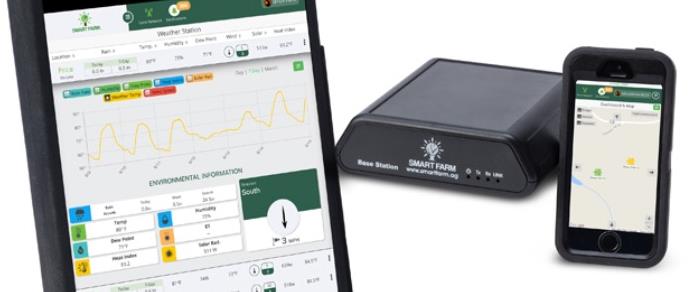Caraway farmer helps develop innovative irrigation system technology
by September 19, 2017 4:01 pm 1,186 views

Water use is critical to any successful farm and a new irrigation-regulating system has been developed by the private company, Smart Farm Inc. The Intelligent Irrigation System allows for precision irrigation, Smart Farm President Bob Farinelli said. Farmers will be able to deliver precise amounts of water at the right moment on a field-by-field basis, he said.
Better water use can increase yields by up to 8%. There are 66,000 water wells in Arkansas that pump 1,700 gallons per minute. A Caraway row crop farmer, Smart Farm Vice-President of sales and marketing Brandon Finch said wells can over-pump by 10 hours per year, meaning there are billions of gallons of wasted water each year in the Natural State. Even a slight reduction in the amount of water wasted would be significant; 6.7 billion gallons could be preserved if 10% of wasted water was saved.
“This is a very exciting product that we are proud to say was developed here in Arkansas by one of our own. This technology takes irrigation to the precision level now made available through modern technology,” Agriculture Council of Arkansas Executive Vice-President Andrew Grobmyer told Talk Business & Politics. “Smart Farm has a product that will revolutionize so much of what agriculture does in providing crops with the water they need. This is key in preserving water supply and making agriculture more productive, profitable, and sustainable.”
Private investors and an angel investor pumped $2.5 million into the project, Finch said. Beta testing was done on his farm in Caraway, on two farms in Trumann and a farm in Pine Bluff. It took five years to develop the system. Extensive testing was conducted because the company didn’t want a lot of “bugs” discovered in the system after it launched.
An app on a farmer’s smart phone or personal computer allows him to monitor all aspects of the irrigation on his farms. Sensors are placed in the water wells, on the irrigation equipment, and in the fields to monitor conditions. One of the biggest problems on any farm is water waste, Finch said.
For example, a farmer may have a rice field that needs three-inches of water. Many farmers will turn a well on, and guesstimate when enough has been pumped. Some will forget the pump is on or it might rain, meaning the water is wasted. A monitor will tell the farmer when the field has the required water and the farmer can shut the well down through the new system. A farmer can set timers, too. If a field reaches a pre-determined soil moisture level such as 58%, then a timer will shut the well down. Another farmer might want to set a timer on a well to run for a straight 72 hours and then shut down.
The most difficult part of the project was the development of the communications systems. Tree lines, rural terrain, and other factors inhibited progress. The communications systems runs off cell phones and can use radio frequency signals, RF, to relay information. A farmer doesn’t have to have a smart phone. The system can run through a personal computer.
Costs will vary from well to well and farm to farm. Finch, an Arkansas Agriculture Council board member, said a ballpark number for the setup on one well would be about $3,000, but there are so many variables contingent upon a particular farm’s setup, it’s difficult to come up with an estimate. Farm setup could take about a week or less and financing options are available.
The system will help improve crop yields, save water, and time, and it will allow a farmer to see how his workers are performing in the fields, Finch said. Farmers will be able to use the data to determine better practices.
“This system allows the farmer to set all his own parameters,” he said.
